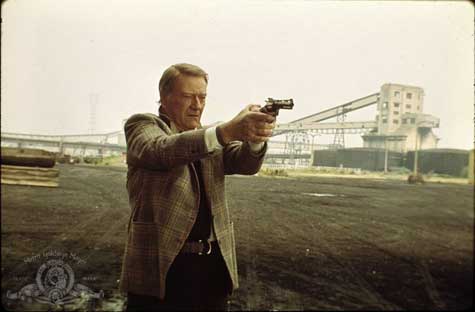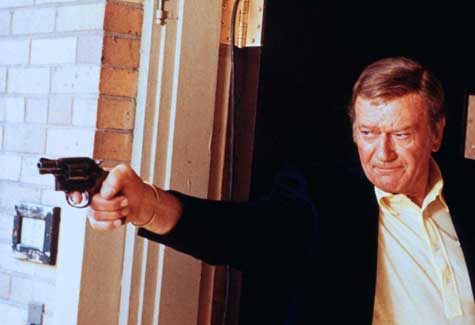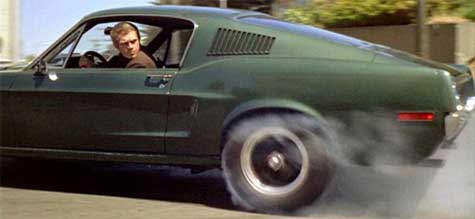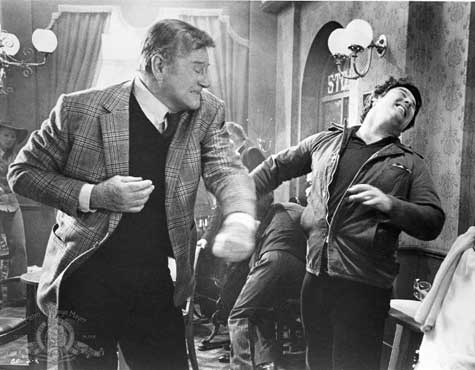
John Wayne (1907-1979), aka The Duke, remained a top ten box office draw for an impressive quarter of a century during which he was primarily known for Western roles in seminal productions like The Searchers (1956), Hondo (1953), and Rio Bravo (1959) and war films like his influential portrayal of Sergeant Stryker in Sands of Iwo Jima (1949). In his last decade, as the lights dimmed on the Western stage and American audiences seemed to have had enough of flag-waving war movies, Wayne turned to playing police officers in McQ (1974) and Brannigan (1975). Clint Eastwood had already made the successful transition from Spaghetti Westerns to playing Dirty Harry, a role that allegedly Wayne and Frank Sinatra had turned down though other reports suggest they were considered too old. Either way, the Chairman of the Board had also made the leap from Western/war flicks to cops and robbers like The Detective (1968). So when Eastwood’s Dirty Harry and its sequels went on to be cultural mega hits, Wayne quickly switched gears and made two cop films back to back to capitalize on that trend. The results were intriguing but less than satisfying.
McQ (1974)
 Wayne was in his late 60’s when he played a Detective Lieutenant affectionately known as “McQ”, a sports car driving police officer who lives on a houseboat. That sounds like a bit of a stretch, yet the agile Duke physically pulls it off as he tracks down cop killers in the Seattle area. What doesn’t work so well is the script for this film, particularly dialogue like “he slipped on a wet floor and fell” after The Duke knocks a local businessman (and major drug dealer) named Manny Santiago (Al Lettieri) unconscious. When a hippie aggressively pesters him, McQ kicks him in the shins and throws out for laughs, “he bumped into a chair.” The lines seem cartoonish these days and I suspect rang just as absurd way back then. The film was influenced by Dirty Harry (1971) but what got audiences behind Harry Callahan abusing a psycho’s (Andy Robinson) civil rights was a young teenage girl buried alive. For right or wrong, we were invested, emotionally, with Eastwood’s breaking rules in hopes of saving her life. In contrast, McQ’s thuggish ways happen so early in the film were almost left identifying with the bad guys—but not quite because the hippies and hoods are cardboard cutouts themselves.
Wayne was in his late 60’s when he played a Detective Lieutenant affectionately known as “McQ”, a sports car driving police officer who lives on a houseboat. That sounds like a bit of a stretch, yet the agile Duke physically pulls it off as he tracks down cop killers in the Seattle area. What doesn’t work so well is the script for this film, particularly dialogue like “he slipped on a wet floor and fell” after The Duke knocks a local businessman (and major drug dealer) named Manny Santiago (Al Lettieri) unconscious. When a hippie aggressively pesters him, McQ kicks him in the shins and throws out for laughs, “he bumped into a chair.” The lines seem cartoonish these days and I suspect rang just as absurd way back then. The film was influenced by Dirty Harry (1971) but what got audiences behind Harry Callahan abusing a psycho’s (Andy Robinson) civil rights was a young teenage girl buried alive. For right or wrong, we were invested, emotionally, with Eastwood’s breaking rules in hopes of saving her life. In contrast, McQ’s thuggish ways happen so early in the film were almost left identifying with the bad guys—but not quite because the hippies and hoods are cardboard cutouts themselves.

No surprise when his captain named Kosterman (Eddie Albert) tells him to stay off the case, McQ quits throwing his gun and badge across the table. Action highlights include Wayne doing a Steve McQueen, chasing some bad guys in his 1973 Pontiac Firebird Trans Am “Green Hornet” and, later, eliminates them using a Mac 10 submachine gun in a climatic chase along a beach. White-knuckle scenes executed well, but too bad someone hadn’t taken the Mac 10 to the writing and started fresh. Even harder to believe this wreck of a movie was directed by John Sturges of The Magnificent Seven and The Great Escape fame.
Brannigan (1975)

Brannigan benefits, like McQ, from The Duke in a modern setting and this time specifically England where he journeys to extradite a hood named Larkin played by John Vernon. Wayne is Mike Brannigan, a Chicago detective with an independent streak; think Frank Bullitt, Harry Callahan, and Popeye Doyle rolled into one. Larkin has hired a hitman named Gorman (Daniel Pipon) to kill Brannigan and the assassin begins immediately following Brannigan when the cop lands at Heathrow. Subsequently, Larkin is kidnapped while getting a massage and whisked away and held for ransom. His lawyer played by Mel Ferrer goes to the police (though he was told not to) and the department sets up a controlled drop that the bad guys outwit them by drilling a hole beneath the public mailbox where the money is deposited. The plot becomes a bit convoluted with double crosses and more than one baddie targeting Brannigan and this is roughly the midway point in the film and therein lies Brannigan’s main problem. It is way, way too slow a build-up for an action film though Wayne’s star presence and the cop-out-of-water plot more or less pulls it off. But even now, almost forty years later, the film could benefit from a needed edit. Why follow Larkin as he meanders through a health club before he is kidnapped? Or watch Brannigan as he talks to his land lady and then in real time takes an elevator to his room? The second half with an amusing barroom brawl and solid chase with a thrilling car jumping a widening gap in the Tower Bridge save the film from being a snooze. All in all passable rainy day fare but not much more.
If Wayne had started making cop films a bit earlier in his career, I think he would have eventually hit his stride. Of the two, Brannigan—though flawed— is worth seeing and in many ways resembles a Western in its storytelling approach. The Duke made two more films after his police departures, Rooster Cogburn (1975) and The Shootist (1976), both returning him to the more familiar setting of horses and six shooters.
Edward A. Grainger aka David Cranmer is the editor/publisher of the BEAT to a PULP webzine and books and the recent anthology collection, The Lizard’s Ardent Uniform and Other Stories.
Read all of Edward A. Grainger's posts at Criminal Element.

Randy Johnson here,
Neither film is a particular favorite of mine. His war films don’t rate high either. Guess I’m spoiled for his many terrific westerns.
On the subject of Sinatra not getting the role of Dirty Harry(never heard Wayne connected), the story I always heard was a hand injury at the time kept him from being able to fire the .44 magnum, “the most powerful handgun ever made.”
Randy, I found a number of sites with different reasons as to why Sinatra didn’t do the film. Yeah, gotta say, if he had made Dirty Harry it would have been a slower film. I like Frank but I don’t see him as Callahan jumping onto a bus. Tony Rome yes. Dirty Harry no.
What it is, John Wayne does not look good wearing a suit. He was just too big. It’s not just Wayne’s age in Brannigan and McQ that makes them two of his least successful movies. The man did not belong in a business suit. Think of it. He seldom wore suits in all the movies he made. The few times he did they were flops. Even back in 1952, when he was still in his prime, Big Jim McClaim was a flop, not because of its right-wing storyline, but he was wearing a suit. He did not not look good batting bad guys around in a suit.
Anyone who believes that statement owes it to themselves to check out THE QUIET MAN.
I’ve gone back to watch some 70s movies, and it’s amazing how slow some of them are. Did we have longer attention spans then, or is the audience today just quicker?
Audiences aren’t quicker….just more impatient.
Yes, I think we had longer attention spans then. I lament that we do not now and insist on immediate action and reveals instead of waiting for them.
His suit didn’t pop out at me, [b]John[/b]. McQ‘s storyline was lacking for the points I noted. Brannigan‘s main flaw was it was so darn slow. Once it got going it was a fairly decent film. Yeah, as far as the wardrobe goes, he looked ok to me. I could be wrong though.
[b]Ron[/b], Films like The Shootist, The Conversation, and The Parallax View unfolded slowly but were edge of your seat drama. And, yes, we had more patience back then for sure.
I remember Brannigan more than I do McQ. I’m not sure why. Could be the story line or something.
David, I was vaguely aware of “Brannigan” but I didn’t know John Wayne starred in it. In fact, I don’t think I have ever seen Wayne in anything other than westerns, so I can’t picture him as a cop. On the other hand, I can clearly picture Eastwood as a cowboy or a cop. He had both the looks.
Prashant, Wayne certainly was the most comfortable in the cowboy roles and that is obviously where audiences preferred him to stay. Also where he became a top ten box office draw from the 1930’s – 1970’s. Quite a lengthy run.
One question I always had was why wasn’t “Brannigan” written as a sequel to “McQ”? Why wasn’t it McQ goes to London? Was there really that much difference between the two characters?